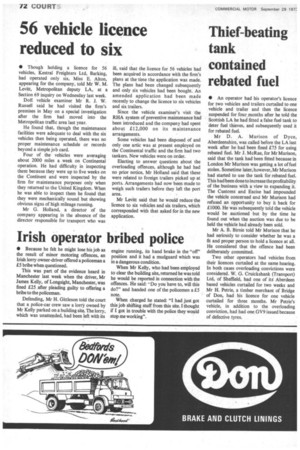56 vehicle licence reduced to six
Page 354

If you've noticed an error in this article please click here to report it so we can fix it.
• Though holding a licence for 56 vehicles, Kestral Freighters Ltd, Barking, had operated only six, Miss E. Alton, appearing for the company, told Mr W. M. Levitt, Metropolitan deputy LA, at a Section 69 inquiry on Wednesday last week.
DoE vehicle examiner Mr R. J. W. Russell said he had visited the firm's premises in May on a special investigation after the firm had moved into the Metropolitan traffic area last year.
He found that, though the maintenance facilities were adequate to deal with the six vehicles then being operated, there was no proper maintenance schedule or records beyond a simple job card.
Four of the vehicles were averaging about 2000 miles a week on Continental operation. He had difficulty in inspecting them because they were up to five weeks on the Continent and were inspected by the firm for maintenance purposes only when they returned to the 'United Kingdom. When he was able to inspect them he found that they were mechanically sound but showing obvious signs of high mileage running.
Mr G. Holland, a director of the company appearing in the absence of the director responsible for transport who was ill, said that the licence for 56 vehicles had been acquired in accordance with the firm's plans at the time the application was made. The plans had been changed subsequently and only six vehicles had been bought. An amended application had been made recently to change the licence to six vehicles and six trailers.
Since the vehicle examiner's visit the RHA system of preventive maintenance had been introduced and the company had spent about £12,000 on its maintenance arrangements.
Some vehicles had been disposed of and only one artic was at present employed on the Continental traffic and the firm had two tankers. New vehicles were on order.
Electing to answer questions about the overloading offences, although he had had no prior notice, Mr Holland said that these were related to foreign trailers picked up at ports. Arrangements had now been made to weigh such trailers before they left the port area.
Mr Levitt said that he would reduce the licence to six vehicles and six trailers, which corresponded with that asked for in the new application.
































































































































































































































































































































































































































































































































